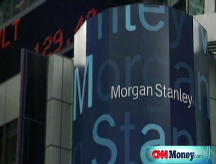The Fed tries to stop the bleeding
The decision to pump $180 billion in fresh cash to the financial markets by world banks is a good move. But will it restore lasting confidence in the markets?

NEW YORK (CNNMoney.com) -- The latest move by the Fed appeared to work - for a few hours at least.
The announcement early Thursday morning that the Federal Reserve and several other foreign central banks were injecting $180 billion of cash into the market - on top of the $67 billion provided earlier this year - is the Fed's latest attempt to restore faith in the financial system.
The move follows the Fed's fevered, but ultimately failed, talks over the weekend to try and save Lehman Brothers (LEH, Fortune 500), the decision on Tuesday to hold interest rates steady and Tuesday night's stunning $85 billion loan to insurer AIG (AIG, Fortune 500).
Unlike those actions, the cash infusion seemed to soothe investor fears, albeit temporarily. U.S. stock markets all shot up Thursday morning, following a rise in European stock markets.
But how long this sense of relief lasts is anybody's guess. In fact, stocks turned south by early afternoon before heading higher again.
Clearly, the move to put more money into what are, to put it mildly, fragile markets is a good thing.
Still, some wonder if the confidence boost will be fleeting as investors continue to speculate about who the next financial bailout or bankruptcy might be.
"I think this helps. Liquidity is an issue," said Phil Dow, director of equity strategy with RBC Wealth Management in Minneapolis. "But trust has to be earned and that doesn't happen overnight."
Even though this morning's rally faded away around noon before resuming again later in the day, it's important to point out that, regardless of what happens with stocks, the new round of cash could lead banks to finally begin lending to one another again.
"This is a focused, well coordinated and well targeted action aimed at dealing with the unfortunate fact that private sector financial institutions worldwide are unwilling to lend to each other," said Daniel Alpert, managing director of Westwood Capital, a New York-based investment bank.
Alpert explained that the Fed and other central banks "did exactly what they needed to" since the deepening credit crisis has caused banks across the globe to seize up as fears spread that nobody is immune.
"This week left banks scrambling for the life-sustaining plasma of overnight funds, because now every institution is concerned - with a lot more justification than in prior months - that every other institution is about to go down - including themselves," he said.
Without doubt, the collapse of Lehman and AIG, combined with Merrill Lynch's (MER, Fortune 500) decision to sell out to Bank of America (BAC, Fortune 500), has caused all major financial institutions to rapidly rethink what the banking landscape will look like in the next few months.
So the deal making in the sector is probably not even close to being over...as evidenced by the published reports indicating that Washington Mutual (WM, Fortune 500) is shopping itself and that Wachovia (WB, Fortune 500) is talking to Morgan Stanley (MS, Fortune 500).
"People are scared to lend anyone money. Nobody's sure who is safe and who isn't," said David Wyss, chief economist with Standard & Poor's. "So we are going to have to see more consolidation take place and people have to feel more confident about lending to each other."
Don't get me wrong. The addition of $180 billion may help unfreeze the credit markets. And that is sorely needed.
But a new era on Wall Street is beginning...and even with the help of the Fed, it's too late to undo the damage that's already been done. Some big brand-name banks have died and more will do so.
The best the Fed can hope for now is to stop the bleeding and let the strongest firms on Wall Street figure out how to make the pieces in the merger puzzle fit.
AIG is out of the Dow: Finally, a quick comment on AIG being booted from the Dow Thursday morning. Kraft (KFT, Fortune 500) is replacing it. As I wrote on Monday, this had to happen but I'm surprised that the folks at the Wall Street Journal didn't use this an excuse to kick out other companies in financial distress, such as GM (GM, Fortune 500).
Still. I'm going to do my best Stephen Colbert now and gloat that I called it! I said back in June and that Kraft was a great candidate for the Dow. Ok. Gloating over. ![]()



